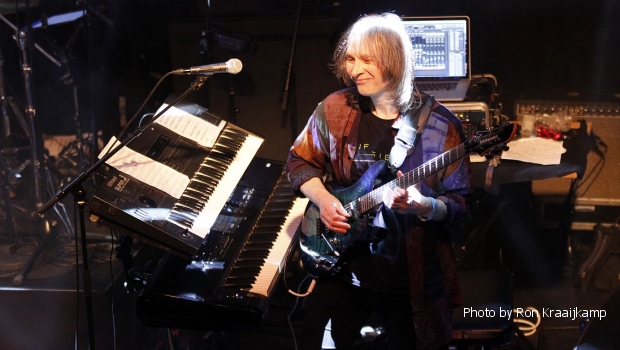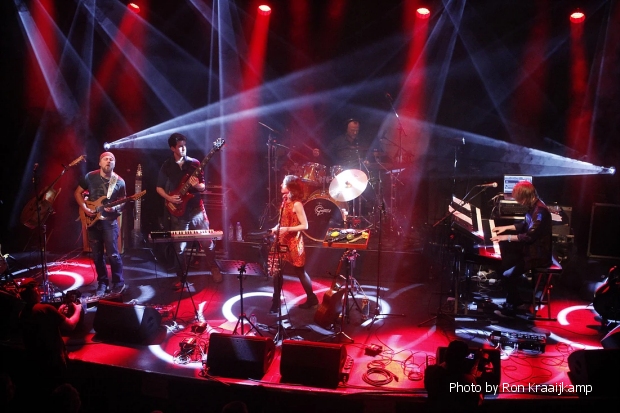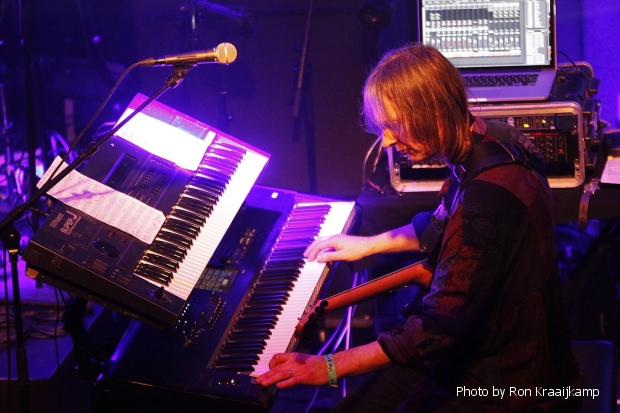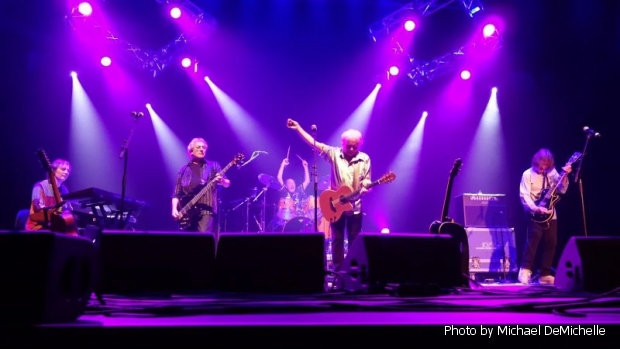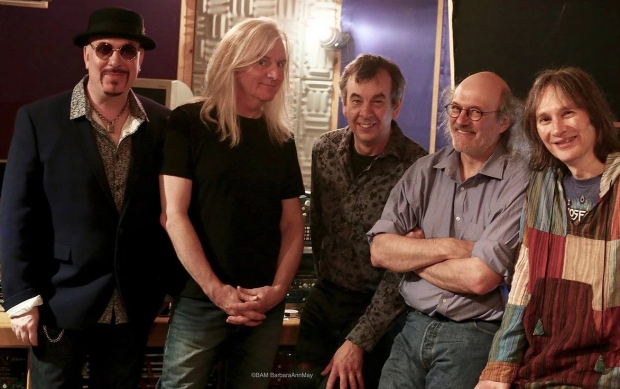Former Iona founder Dave Bainbridge has been a busy man of late with current live projects including Celestial Fire, Strawbs, his duo with Sally Minnear, Lifesigns and occasional solo concerts. TPA’s John Wenlock-Smith spoke to Dave about his long musical history and his approach to music…
What is your musical history and who influenced you in that journey? What attracted you to Progressive music initially?
I came from a very musical family, with my mam and dad both being musicians as well as my sister and many aunts and uncles, so I was steeped in music from an early age. I started classical piano lessons when I was 8, though I got my first toy guitar aged 2! My older sister Maureen probably influenced me more than anyone in those early years. She had a great record collection, which I would regularly go through and discover new music. Anything from The Beatles, Jethro Tull, Jimi Hendrix, through blues albums and more psychedelic bands like Vanilla Fudge. One album she had probably affected more than any of the others and that was her 3 disk album of the 1969 Woodstock Festival. I listened to that album constantly, especially the tracks by Jimi Hendrix, Ten Years After, Crosby, Stills, Nash and Young and Santana, which I loved. Once I started playing the guitar when I was 13 or 14, having some lessons with my dad, I went back to that album to try and learn some of the guitar riffs and solos from these tracks.
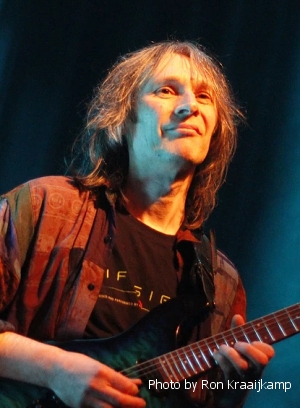 The early ’70’s was an amazing time for music, with so many great and diverse bands and artists. Me and my friends would constantly listen to music and go and see bands. We didn’t think about genres and neither, I think, did the bands. However, when I heard bands like Yes, Genesis, Gentle Giant, ELP, Curved Air and Focus I could hear the influence of western ‘classical’ music in what they were doing. This differed from bands like Deep Purple, Free and Led Zeppelin (whom I also loved), whose approach was steeped more in the blues tradition. I also loved ‘classical’ music and folk music and it really appealed to my imagination that you could combine these influences with rock. So, as a pianist, when I heard people like Rick Wakeman and Keith Emerson conjuring all these incredible sounds from their multiple keyboards, I knew straight away that this was the directions for me. I also loved the Japanese synthesist Tomita’s unbelievable (for the time) interpretations of the music of Debussy and other major composers. I also then discovered the Mahavishnu Orchestra and how Indian musical ideas could be combined with rock and jazz. It was a time of incredible discovery and experimentation in music.
The early ’70’s was an amazing time for music, with so many great and diverse bands and artists. Me and my friends would constantly listen to music and go and see bands. We didn’t think about genres and neither, I think, did the bands. However, when I heard bands like Yes, Genesis, Gentle Giant, ELP, Curved Air and Focus I could hear the influence of western ‘classical’ music in what they were doing. This differed from bands like Deep Purple, Free and Led Zeppelin (whom I also loved), whose approach was steeped more in the blues tradition. I also loved ‘classical’ music and folk music and it really appealed to my imagination that you could combine these influences with rock. So, as a pianist, when I heard people like Rick Wakeman and Keith Emerson conjuring all these incredible sounds from their multiple keyboards, I knew straight away that this was the directions for me. I also loved the Japanese synthesist Tomita’s unbelievable (for the time) interpretations of the music of Debussy and other major composers. I also then discovered the Mahavishnu Orchestra and how Indian musical ideas could be combined with rock and jazz. It was a time of incredible discovery and experimentation in music.
Tell us about your part in the very significant band Iona.
My good friend, saxophone and woodwind player David Fitzgerald and I formed Iona in 1989. We had been working together for a while as sidemen for various artists but realised that when we improvised together something magical happened. We both loved the same kind of music and wanted to work on our own project together. To cut a long story short (you can find out more in the history pages on the Iona website), David and I discovered the rich stream of the ‘Celtic Christian’ heritage that extended from Ireland to the island of Iona in the 6th Century and then throughout Scotland and northern Britain over the next hundred years or so. Iona is a beautiful island off the west coast of Scotland and we were also inspired by its incredible landscapes and unique spiritual atmosphere. This all gave us a focus around which to write the music we were working on. Soon after, Joanne Hogg joined us and Iona the band was formed. David left in 1992 to pursue a music degree, but Joanne and I carried on with the band right up until its demise in 2015/16, recording many albums and touring around the world.
What inspired you to form Celestial Fire?
For a while I’d wanted to record an album that was inspired by the music that I loved as a teenager. Not a tribute album, but something new and fresh and contemporary, but with a nod to those who first inspired me to want to become a musician. So the album Celestial Fire was born, which came out under my name in 2014. I wanted to form a band that could play the often complex material on that album in a live setting and that coincided with realisation that Iona had run its course, certainly for the time being. Originally Collin Leijenaar, who drummed on the Celestial Fire album, was to be in the band, but he had to stop playing for a year or two because of some problems with his arms (thankfully he’s now playing again). So the obvious choice to replace him was my good friend of many years from Iona, Frank van Essen. Frank is not only a great drummer, but an incredible violin player, so this actually gave us more scope to cover not only the Celestial Fire music, on which he plays violin, but to add in a number of Iona tracks.
Randy George, who played bass on the album wasn’t a practical choice to play in the live band as he lives 5,000 miles away in the Western U.S.A. and the only other person I knew who could play his complex bass parts with the same feel was Simon Fitzpatrick, who also plays with Carl Palmer.
I also needed someone else to cover either keys or guitar parts and my good friend Dave Brons was the obvious choice. Dave has been a big Iona fan since his teens, so he was already familiar with the style of music.
So the modus operandi of the band was to play music from my solo albums, in particular the Celestial Fire album, but also to keep the Iona flame alive and especially to perform live many of the Iona songs that we either never played live or only played very rarely.
And Celestial Fire seemed a very appropriate band name as the music veers from the ethereal to the fiery!
Where did Sally Minnear come into the picture?
I first met Sally when she was still at school, when I was staying with her parents Kerry and Leslie. Kerry was of course the keyboardist/multi instrumentalist in Gentle Giant in the ’70s – a band I loved. Through a mutual friend we met up in 1991 and have stayed good friends ever since. So through Kerry I’d followed Sally’s progress as a singer and absolutely loved her voice. In fact, back in 2008, when Joanne had a year’s sabbatical from Iona and had even suggested the band get another singer, I had considered Sally as a possible replacement. Sally had grown up listening to and loving Iona’s music and had seen us live several times. But in the end Jo’s voice is so much part of the Iona sound that I felt it would not be right to have anyone else sing in the band. However, forming the band Celestial Fire presented the opportunity, as I’ve mentioned, to keep the Iona flame alive and bringing the music to new listeners, but under a new identity.
The first gig Sally and I played together was in December 2014. I’d been booked to do a solo gig, but with a local guest singer called Hannah Middleton featuring on some Iona songs. However, at the last minute, Hannah was taken ill and couldn’t make it, so I asked Sally if she’d be interested in coming along to sing, which she was. She already knew the Iona songs in the set and it worked great. Sally sang some of the parts on the Celestial Fire album and seemed like a logical choice as the lead vocalist for the band.
The fact that Sally, like her dad, is also very competent on several instruments brings a whole lot more to the band’s sound.
Celestial Fire works as a band and as a duo, what difference does it make when playing live?
When Sally and I play as a duo it is just under our own names, not as Celestial Fire. That name is reserved for the full band. There is a crossover of some of the material, but not much. The duo features more acoustic instruments and more spontaneous improvisation. We also lean more towards a ‘Celtic’ folk element but not by any means exclusively. I still play a lot of electric guitar and Sally has a more extensive percussion set up, so it can sound very big and rocky at times, but also quiet and ethereal. The band is an altogether different beast, with a huge range of dynamics in the music and some incredible interplay between Frank and Simon in the rhythm section.
You cover a lot of Iona and traditional Celtic music, what is it about that style that draws you?
As a teenager I loved all the previously mentioned progressive and rock bands, but I also discovered many folk based artists that I loved, such as Alan Stivell, Planxty, Clannad and the Irish band Horslips, who were the first band I’m aware of that used uilleann pipes in a rock setting. There is something very timeless about the best folk melodies. They seem to evoke the memories of generations past and connect us to a different time and place. They can work in a number of settings too and often be re-harmonised to great effect.
I grew up surrounded by female singers – my mam and two aunties were all really good singers, as was my sister, so it was natural for me to want to incorporate that sound into my music. When I first heard Clannad, on a TV show when I was 16 or 17, I was totally captivated by Moya Brennan’s voice. It was so rich and haunting and evocative, especially when she sang in Gaelic, that I wanted to fuse those elements into the music I was writing. On my Veil of Gossamer album Mae McKenna sings in Scottish Gaelic and it just sounds glorious.
I also loved Mike Oldfield’s early work and especially all the acoustic instruments he brought into his sound. That was another thing I wanted to do, to fuse all these different elements and sounds to create interesting and varied soundscapes.
Obviously there is a big spiritual element to the music that reflects your own Christian faith yet you don’t preach as such, why is that?
I think it’s very easy to overtly express religious, political or sexual views in lyrics, but more difficult to express the mystery and profundity of life. That, to me, requires a much more artistic approach and is ultimately much more satisfying. I get fed up of the bland, and so obvious boy/girl relationship lyrics on so many contemporary pop tunes I hear. They don’t leave anything to the imagination. It wasn’t always the case. The late Sir John Tavener, who was an incredible composer of music that had so much spiritual depth, once said something to the effect that most music is of the earth and it leaves you there, but the best music makes you look up. That is what I always hope for my music, that in awe it points to a greater reality and is inclusive enough for everyone to understand this and be inspired to look further, and not feel marginalised and turned off. I don’t believe that the terms ‘sacred’ and ‘secular’ were ever God’s idea, because, as David Adam one said, it implies that some are loved and others not.
The new DVD is an excellent representation of your current live set. Was it hard to choose what songs to leave out? I especially liked the Q & A at the end and the bonus live songs from Sheffield.
Thanks. Yes it is pretty representative of the current live set that Sally and I do. We only had a day to film and record everything, so we basically played through as much stuff as we had time for! I’m really glad the live tracks from the Lantern Theatre were also included on the DVD. Although the picture quality isn’t that great, it does capture good performances of some of the songs we just didn’t have time to record in the studio.
Now that we’ve done this DVD, apart from playing at the Lynn Guitar Festival near Pwllheli on 29th September, there will be a break from duo gigs for a while as I’ll be busy with Lifesigns and Strawbs for the coming several months. When we reconvene, the plan is to do a completely different duo set, which incorporates a number of Iona songs we’ve never done, a few traditional songs that will be new to us, and, more importantly, some brand new material that we’re working on, written specifically for the duo.
Looking at your website I see there are lots of live appearances over the next few months. You seem to have a very Protestant Work Ethic.
I love playing live and it’s nice to be busy playing with great bands and musicians. I love the mix of live and studio work and the creative challenges that both offer. When my autistic son Luca was young, I cut down a lot on live work, in order to be around for him, so I suppose I’m playing catch up a bit now that he’s almost 21.
Obviously you also play with both Lifesigns and The Strawbs – how did that come about?
In March 2015, my friend, guitarist Paul Bielatowicz was on a Classic Legends of Rock tour with Carl Palmer. Also on the bill were the Acoustic Strawbs. Dave Cousins had mentioned to Paul that they were looking for a keyboard player for some upcoming U.K. dates as Adam Wakeman, who was playing with them at the time, was unavailable due to a Black Sabbath tour he was on. Paul recommended me and I came to one of the gigs and met up with Dave. We got on very well. Dave was already familiar with my work with Iona and we arranged for Dave to come to my studio after he’d finished the tour. The studio visit turned into a writing/recording session for what would become the title track for the recent Strawbs album The Ferryman’s Curse and we worked really well together. As it turned out, right after this, Dave had some health issues, so further writing work was put on hold and the Strawbs tour I would have played on was postponed. So my first live appearance with the band was at the beginning of 2016 on the Moodies Cruise in the Caribbean! And I’ve been a permanent fixture since then and love playing with the band.
John Young (of Lifesigns) and I had met briefly in 2000 or 2001 when Iona were playing at the Classic Rock Society’s Rotherham Rocks festival, and John was doing a solo set. After that I didn’t see him again until about 2 1/2 years ago, when Strawbs were playing at a venue near where he lived. The day before, one of my keyboards had developed a fault and Dave Cousins suggested we call John to see if I could borrow a keyboard from him. Being the generous person he is, John duly obliged and turned up at the venue with one of his keyboards, saving the day!! We kept in touch after that and soon after he asked me to play guitars on the Lifesigns Cardington album. Nico (Tsonev), the Lifesigns guitarist, had by then left the band and John asked if I’d like to join, which I was thrilled to be able to do, in between Strawbs activities. We have become good friends in the past couple of years.
What does the future hold for Celestial Fire?
We’ve started working on new material for the first Celestial Fire band album, but it will be on hold for a while now as I’ll be on tour with Strawbs and Lifesigns, then working on orchestral arrangements for the Strawbs 50>sup>th Anniversary weekend, which takes place in New Jersey in April. But the last couple of Celestial Fire gigs have been great and the band has so much potential, so I hope we’ll be able to play live much more later next year, performing the new material. It’s very hard to make it work financially though, so I hope we’ll be able to find someone who shares our vision and is able to help us achieve our goals.
I saw you with Iona many years ago at Greenbelt. That band is on hiatus, will there be any more live work from Iona?
At this stage I don’t know. I loved playing live with Iona but not everyone in the band was as enthusiastic about touring, so it sort of ground to a halt. But never say never.
Tell me about who influences your fluid guitar style.
There are so many guitarists that I love and who have influenced my playing that the list could get very long. But I’ve also tried to absorb stylistic traits from singers and non-guitar instrumentalists, such as uilleann pipe players and low whistle players. I think that is very important to do, because it forces you out of standard guitar fingerings and phrases and towards finding a new voice. Jeff Beck is the master of this in how he is able to play melodies with such incredible vocal-like sounds and inflections. For example, he spent a long time listening to Indian vocalists to work out how they phrased their melodies, with their characteristic bends and vibrato.
Working with two great uilleann pipe players in Troy Donockley and Martin Nolan over many years, I’ve tried to absorb how they approach their melodies, with all the little grace notes and bends that are characteristically heard on the instrument. Actually Dave Brons, who plays guitar in Celestial Fire, has taken this to another level and can play pipe lines with an amazing amount of detail in all the inflections he adds, to make his guitar sound incredible uilleann pipe-like!
I grew up listening to lots of blues players and then later played with many great blues guitarists and although the style can sound cliche’d in the wrong hands, I’ve always loved the raw passion that the best blues guitarists inject into their playing. So I aspire towards that emotional impact as well. I try to say something emotionally when I play and also think about melody and choosing notes that add tension and release, so that the listener is not just presented with a long stream of notes that fit the chords, but don’t really cut to the heart.
Thank you Dave.

